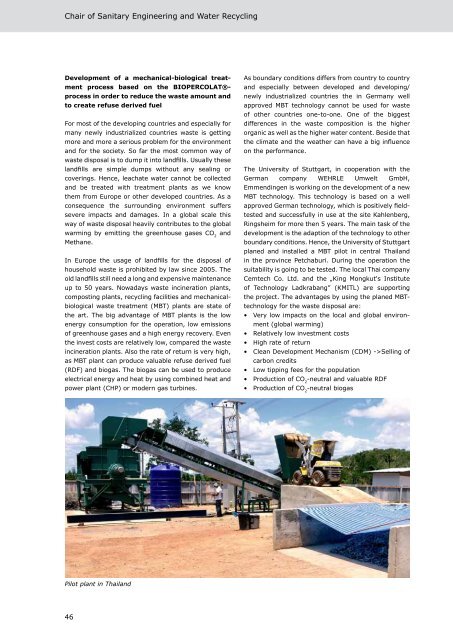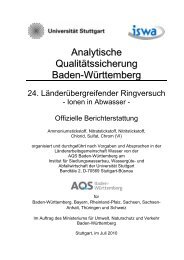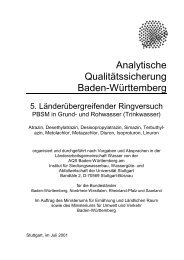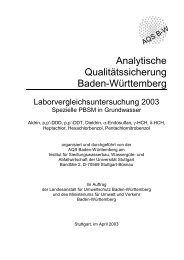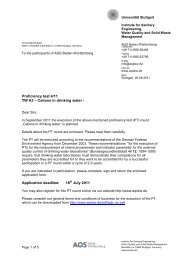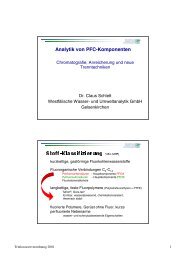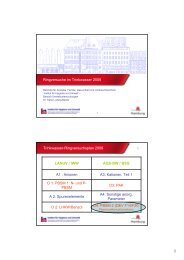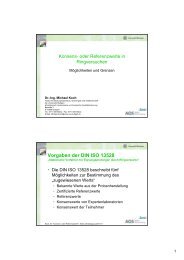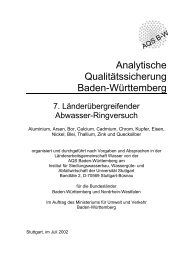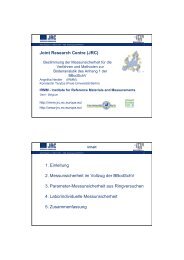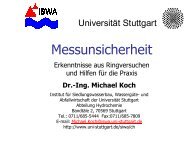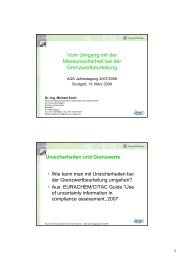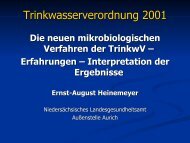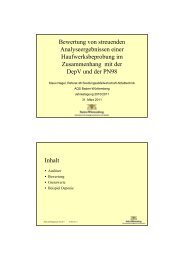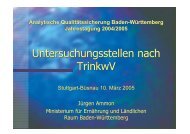Download - Institut für Siedlungswasserbau, Wassergüte- und ...
Download - Institut für Siedlungswasserbau, Wassergüte- und ...
Download - Institut für Siedlungswasserbau, Wassergüte- und ...
Create successful ePaper yourself
Turn your PDF publications into a flip-book with our unique Google optimized e-Paper software.
Chair of Sanitary Engineering and Water Recycling<br />
Development of a mechanical-biological treatment<br />
process based on the BIOPERCOLAT®process<br />
in order to reduce the waste amount and<br />
to create refuse derived fuel<br />
For most of the developing countries and especially for<br />
many newly industrialized countries waste is getting<br />
more and more a serious problem for the environment<br />
and for the society. So far the most common way of<br />
waste disposal is to dump it into landfills. Usually these<br />
landfills are simple dumps without any sealing or<br />
coverings. Hence, leachate water cannot be collected<br />
and be treated with treatment plants as we know<br />
them from Europe or other developed countries. As a<br />
consequence the surro<strong>und</strong>ing environment suffers<br />
severe impacts and damages. In a global scale this<br />
way of waste disposal heavily contributes to the global<br />
warming by emitting the greenhouse gases CO 2<br />
and<br />
Methane.<br />
In Europe the usage of landfills for the disposal of<br />
household waste is prohibited by law since 2005. The<br />
old landfills still need a long and expensive maintenance<br />
up to 50 years. Nowadays waste incineration plants,<br />
composting plants, recycling facilities and mechanicalbiological<br />
waste treatment (MBT) plants are state of<br />
the art. The big advantage of MBT plants is the low<br />
energy consumption for the operation, low emissions<br />
of greenhouse gases and a high energy recovery. Even<br />
the invest costs are relatively low, compared the waste<br />
incineration plants. Also the rate of return is very high,<br />
as MBT plant can produce valuable refuse derived fuel<br />
(RDF) and biogas. The biogas can be used to produce<br />
electrical energy and heat by using combined heat and<br />
power plant (CHP) or modern gas turbines.<br />
As bo<strong>und</strong>ary conditions differs from country to country<br />
and especially between developed and developing/<br />
newly industrialized countries the in Germany well<br />
approved MBT technology cannot be used for waste<br />
of other countries one-to-one. One of the biggest<br />
differences in the waste composition is the higher<br />
organic as well as the higher water content. Beside that<br />
the climate and the weather can have a big influence<br />
on the performance.<br />
The University of Stuttgart, in cooperation with the<br />
German company WEHRLE Umwelt GmbH,<br />
Emmendingen is working on the development of a new<br />
MBT technology. This technology is based on a well<br />
approved German technology, which is positively fieldtested<br />
and successfully in use at the site Kahlenberg,<br />
Ringsheim for more then 5 years. The main task of the<br />
development is the adaption of the technology to other<br />
bo<strong>und</strong>ary conditions. Hence, the University of Stuttgart<br />
planed and installed a MBT pilot in central Thailand<br />
in the province Petchaburi. During the operation the<br />
suitability is going to be tested. The local Thai company<br />
Cemtech Co. Ltd. and the „King Mongkut‘s <strong>Institut</strong>e<br />
of Technology Ladkrabang” (KMITL) are supporting<br />
the project. The advantages by using the planed MBTtechnology<br />
for the waste disposal are:<br />
• Very low impacts on the local and global environment<br />
(global warming)<br />
• Relatively low investment costs<br />
• High rate of return<br />
• Clean Development Mechanism (CDM) ->Selling of<br />
carbon credits<br />
• Low tipping fees for the population<br />
• Production of CO 2<br />
-neutral and valuable RDF<br />
• Production of CO 2<br />
-neutral biogas<br />
Pilot plant in Thailand<br />
46


